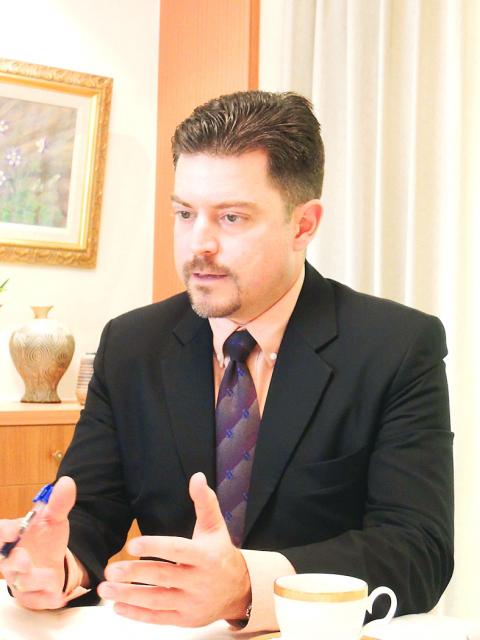The raising of the Republic of China (ROC) flag at Twin Oaks Estate in Washington continues to cause diplomatic ripples between Taiwan and the US, with Washington seeking reassurance that such an incident will not happen again.
The US hopes that Taiwan will “demonstrate the priority it puts on the US-Taiwan relationship by ensuring that these kinds of things do not happen again,” American Institute in Taiwan (AIT) spokesman Mark Zimmer said yesterday in Taipei.
Zimmer’s remarks could be seen as a blow to Representative to the US Shen Lyu-shun’s (沈呂巡) statement on Wednesday that he hopes to continue raising the ROC flag on special occasions at Twin Oaks, the residence of the nation’s official representative to the US.

Photo: Ke Yu-hao , Taipei Times
Speaking at a meeting of the legislature’s Foreign and National Defense Committee, Shen said the ROC flag should be able to fly at Twin Oaks to commemorate the 70th anniversary of the end of World War II — which Shen referred to as the (Anti-Japan) Resistance War — or fly at half-mast to commemorate the Nanjing Massacre.
“And they are not supposed to be opposed by the Chinese government,” he added.
While lauding Shen’s patriotic act, Democratic Progressive Party (DPP) lawmakers frowned on his suggestions which smack of Chinese nationalism, reminding Shen that he is an envoy appointed by the Republic of China and not by the People’s Republic of China.
When asked whether he would be willing to commemorate the 228 Massacre as well, Shen said: “Certainly.”
However, the AIT’s public statement has put a damper on all these ideas.
Zimmer yesterday said that the US “did not approve or know about the Jan. 1 flag-raising at Twin Oaks in advance” and, as US Department of State spokesperson Jen Psaki had said, the US is “disappointed with this action.”
“We have raised our serious concerns with senior Taiwan authorities in Taipei and Washington,” Zimmer said, adding that the US hoped Taiwan would make sure such an incident would not happen again.
The remarks could be seen as an admonishment as Washington steps up the pressure on Taipei.
On Tuesday, Psaki had tempered her comments, saying only that the US “is disappointed with the action” and that “the flag-raising ceremony violated our longstanding understanding on the conduct of our unofficial relations.”
“We have a robust set of cultural relations, but we do not have diplomatic relations. And we’ll continue to discuss this with the proper officials,” Psaki said.
Ministry of Foreign Affairs spokesperson Anna Kao (高安), when asked about the AIT’s statement, said that Taipei would continue to discuss the matter with Washington.
“Both Taiwan and the US value greatly the longstanding cooperative relationship between the two sides and will continue strengthening it in the future,” Kao said.

Intelligence agents have recorded 510,000 instances of “controversial information” being spread online by the Chinese Communist Party (CCP) so far this year, the National Security Bureau (NSB) said in a report yesterday, as it warned of artificial intelligence (AI) being employed to generate destabilizing misinformation. The bureau submitted a written report to the Legislative Yuan in preparation for National Security Bureau Director-General Tsai Ming-yen’s (蔡明彥) appearance before the Foreign Affairs and National Defense Committee today. The CCP has been using cognitive warfare to divide Taiwanese society by commenting on controversial issues such as Taiwan Semiconductor Manufacturing Co’s (TSMC, 台積電) investments in the

INVESTIGATION: The case is the latest instance of a DPP figure being implicated in an espionage network accused of allegedly leaking information to Chinese intelligence Democratic Progressive Party (DPP) member Ho Jen-chieh (何仁傑) was detained and held incommunicado yesterday on suspicion of spying for China during his tenure as assistant to then-minister of foreign affairs Joseph Wu (吳釗燮). The Taipei District Prosecutors’ Office said Ho was implicated during its investigation into alleged spying activities by former Presidential Office consultant Wu Shang-yu (吳尚雨). Prosecutors said there is reason to believe Ho breached the National Security Act (國家安全法) by leaking classified Ministry of Foreign Affairs information to Chinese intelligence. Following interrogation, prosecutors petitioned the Taipei District Court to detain Ho, citing concerns over potential collusion or tampering of evidence. The

‘COMPREHENSIVE PLAN’: Lin Chia-lung said that the government was ready to talk about a variety of issues, including investment in and purchases from the US The National Stabilization Fund (NSF) yesterday announced that it would step in to staunch stock market losses for the ninth time in the nation’s history. An NSF board meeting, originally scheduled for Monday next week, was moved to yesterday after stocks plummeted in the wake of US President Donald Trump’s announcement of 32 percent tariffs on Taiwan on Wednesday last week. Board members voted to support the stock market with the NT$500 billion (US$15.15 billion) fund, with injections of funds to begin as soon as today. The NSF in 2000 injected NT$120 billion to stabilize stocks, the most ever. The lowest amount it

NEGOTIATIONS: Taiwan has good relations with Washington and the outlook for the negotiations looks promising, Minister of Economic Affairs J.W. Kuo said Taiwan’s GDP growth this year is expected to decrease by 0.43 to 1.61 percentage points due to the effects of US tariffs, National Development Council (NDC) Minister Paul Liu (劉鏡清) said at a meeting of the legislature’s Economics Committee in Taipei yesterday, citing a preliminary estimate by a private research institution. Taiwan’s economy would be significantly affected by the 32 percent “reciprocal” tariffs slapped by the US, which took effect yesterday, Liu said, adding that GDP growth could fall below 3 percent and potentially even dip below 2 percent to 1.53 percent this year. The council has commissioned another institution